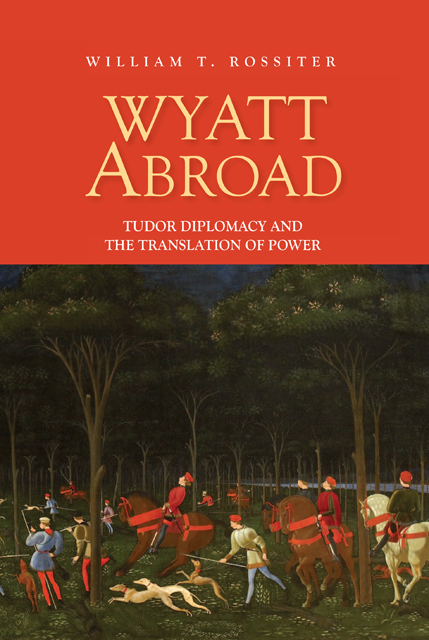Book contents
- Frontmatter
- Contents
- List of Illustrations
- Acknowledgements
- Note on Editions Used
- Abbreviations
- Introduction: The First Reformer?
- Chapter 1 ‘Sovendra du chaseur’: Wyatt in France, French at the English court
- Chapter 2 ‘My galy charged’: Wyatt in Italy
- Chapter 3 ‘So feble is the threde’: Wyatt in Spayne
- Chapter 4 ‘Inward Sion’: Wyatt in Jerusalem – The Penitential Psalms and Soteriological Diplomacy
- Conclusion: ‘In Kent and Christendome’: Wyatt in England
- Glossary of Rhetorical and Literary Terms
- Bibliography
- Index
Introduction: The First Reformer?
Published online by Cambridge University Press: 23 February 2023
- Frontmatter
- Contents
- List of Illustrations
- Acknowledgements
- Note on Editions Used
- Abbreviations
- Introduction: The First Reformer?
- Chapter 1 ‘Sovendra du chaseur’: Wyatt in France, French at the English court
- Chapter 2 ‘My galy charged’: Wyatt in Italy
- Chapter 3 ‘So feble is the threde’: Wyatt in Spayne
- Chapter 4 ‘Inward Sion’: Wyatt in Jerusalem – The Penitential Psalms and Soteriological Diplomacy
- Conclusion: ‘In Kent and Christendome’: Wyatt in England
- Glossary of Rhetorical and Literary Terms
- Bibliography
- Index
Summary
In 1589 George Puttenham published his famous account of the Tudor makers who emerged at the court of Henry VIII:
In the latter end of the same king’s reign there sprang up a new company of courtly makers, of whom Sir Thomas Wyat th’elder & Henry Earle of Surrey were the two chieftaines, who hauing trauailed into Italie, and there tasted the sweete and stately measures and stile of the Italia[n] Poesie as nouices newly crept out of the schooles of Dante Arioste and Petrarch, they greatly pollished our rude & homely maner of vulgar Poesie, from that it had bene before, and for that cause may iustly be sayd the first reformers of our English meetre and stile. … I repute them (as before) for the two chief lanterns of light to all others that have since employed their pens on English poesy. Their conceits were loftie, their stiles stately, their conueyance cleanely, their terms proper, their meetre sweete and well proportioned, in all imitating very naturally and studiously their Maister Francis Petrarcha.
Puttenham’s use of the term ‘reformers’ marks a clear correspondence between the political upheaval of Henry’s reign and its literary culture, as part of what has been termed the Henrician cultural revolution. Puttenham implicitly posits a Protestant poetics avant la lettre – with the reformed religion came a reformed poesie. The term ‘reformers’ is noticeably not ‘translators’, even though the emphasis upon ‘the sweete and stately measures and stile of the Italiā[n] Poesie’ places translation at the heart of the reformed ‘English meetre and stile’. Indeed, Puttenham made it clear that he considered translation a secondary activity compared to the primary activity of poetry. According to Puttenham, the person who employs ‘any foreine copie or example, as doth the translator … may well be sayd a versifier, but not a Poet’, but he later contradicts himself in part by claiming that ‘a Poet may in some sort be said a follower or imitator … and so in that respect is both a maker and a counterfaiter’, just as Sidney had claimed in his Defence that poetry ‘is an Art of Imitation: for so Aristotle termeth it in the word μίμησις [mimesis], that is to say, a representing, counterfeiting, or figuring forth’.
- Type
- Chapter
- Information
- Wyatt AbroadTudor Diplomacy and the Translation of Power, pp. 1 - 46Publisher: Boydell & BrewerPrint publication year: 2014



